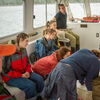
How Maine companies are creatively navigating the workforce rollercoaster
Maine's labor market demands workforce innovation. As employers deal with state issues combined with the nation's toughest staffing challenges — with only 73 available workers for every 100 open jobs — they're creating new strategies to handle both worker shortages and necessary layoffs.

Maine companies are leading the way in four key areas: creative recruitment and retention solutions, smart workforce reduction management, flexible seasonal employment models and practical approaches for businesses of all sizes.
Perfect storm conditions
Maine faces multiple workforce challenges that need new solutions. The state's population is the nation's oldest at 44.8 years median age, with 23% over 65, while unemployment sits at just 3.2%. Seasonal employment jumps by 20,500 workers during peak summer months, but often falls short of demand, with only 29% of Maine Tourism Association members reporting enough staff.
Creative recruitment and retention
Many Maine companies are expanding their search areas and changing benefits to compete for workers. Bath Iron Works shows how this works by investing $11 million in recruiting while partnering with Western Maine Transportation for Lewiston-Bath commuter buses, helping workers commute 70-plus miles. The shipbuilder's 15% annual wage increases from 2021-23 helped keep 6,700 employees — 12.4% of Maine's entire manufacturing workforce.
Transportation-focused strategies are proving effective. Sugarloaf Resort provides affordable housing at the historic Herbert Grand with shuttle service, while Saddleback Mountain received $488,130 in state grants for shuttle services connecting Farmington and Oquossoc. Sunday River Resort offers free ski passes across all Boyne Resort properties alongside transportation partnerships.
The Maine fishing industry shows how to build future workers through next-generation programs. The Maine Coast Fishermen's Association's $1.77 million federal investment in youth development keeps 93% of participants who enter fishing careers.
To expand the pipeline, the Maine Department of Labor recently awarded $6.4 million to apprenticeship and pre-apprenticeship programs expected to reach more than 1,000 workers statewide, while the Union Construction Academy expanded its capacity to train 250 students annually in critical trades.
Workforce reduction management
When workforce cuts become necessary, Maine employers focus on keeping relationships strong and protecting their company's reputation. The state's WorkShare Program lets employers reduce hours by 10% to 50% instead of layoffs, with unemployment benefits making up for lost income.
Outplacement career support has gained traction as a way to protect company reputation during workforce cuts. Maine employers who partner with career coaching firms see laid-off workers land new jobs faster, which reduces unemployment insurance costs, limits negative publicity and helps maintain relationships with remaining employees.
The state's response to Abbott Laboratories' 750-plus worker layoff in 2023 featured partnerships with community organizations that dramatically improved outcomes, particularly for workers with language barriers or limited transferable skills. Companies implementing structured post-layoff communication and comprehensive career support services see 50% faster employee engagement recovery among remaining staff.
Cross-training programs serve dual purposes in both shortage and surplus management. Companies report 50% productivity increases from teams with cross-trained members, while providing flexibility during workforce adjustments.
Seasonal employment models
Maine's seasonal industries are creating flexible workforce models that other businesses can copy. The tourism sector's Maine Tourism Career Center brings together six associations to provide central recruiting and job placement services. L.L.Bean shows how to manage seasonal manufacturing by ramping up holiday production while offering extensive cross-training opportunities.
The fishing industry's three seasonal fish culturist positions running 30 weeks from late April to mid-November, plus volunteer programs, show creative staffing approaches. Retail employers use employee referral programs with workers who return year after year, creating predictable seasonal workforce cycles.
Small business strategies
Small and midsize employers demonstrate that workforce flexibility requires upfront investment but delivers measurable returns. Gagne Foods implemented e-bike programs for transportation-challenged employees, logging nearly 500 rides over six months. Industrial Roofing Co. purchased electric crew trucks with charging stations, enabling ride-sharing across multiple regions.
Hannaford Supermarkets' reclassification of 1,040 employees to hourly positions with overtime pay, affecting 380 of its 9,500 Maine workers, shows how policy adjustments can improve retention without major infrastructure investments.
The path forward
Maine's workforce innovations show that creative staffing management — combining transportation solutions, better benefits, educational partnerships, clear communication and professional career support services — can turn labor market challenges into competitive advantages. As demographic trends continue changing workforce availability, Maine employers are creating templates that focus on both business success and worker dignity.













0 Comments